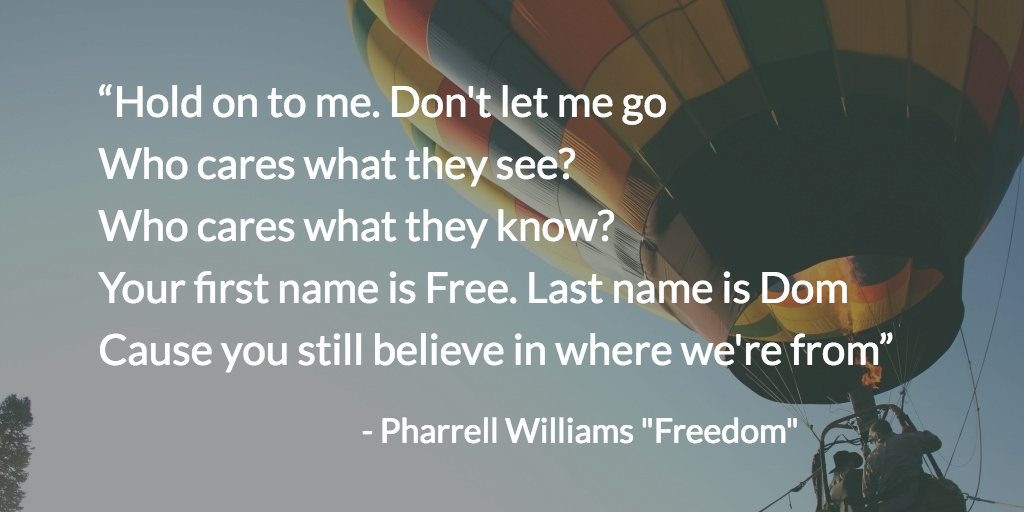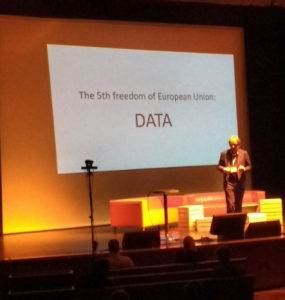This piece is part of a series of posts from MyData 2016 – an international conference that focuses on human centric personal information management. The conference is co-hosted by the Open Knowledge Finland chapter of the Open Knowledge International Network.
 Song lyrics: Pharrell Williams “Freedom”; Image Pixabay CC0
Song lyrics: Pharrell Williams “Freedom”; Image Pixabay CC0
Indeed, the theme of MyData so far is freedom. The freedom to own our data. Freedom however, is a very complicated subject that has been subjected to so many arguments, interpretations and even wars. I will avoid the more complicated philosophy and dive instead into a more daily life example. In the pop song quoted above, freedom can be understood as being carefree – “Who cares what they see and what they know?” Taking it to the MyData context, are we granting freedom to others to do whatever they want with our data and information because we trust them, or just because we don’t care?
 MyData speakers have looked at the issue of freedom from a different angle. Taavi Kotka, Estonia CIO, claims that the fifth freedom of the EU should be the freedom of Data. People, explains Kotka, should have the choice of what can be done with their data. They should know and understand the possibilities that sharing the data can bring (for example, like better and easier services across the EU countries), and the threat that this can entail, like misuses of their data. For that we need pioneer regulators. For that we need the private sector and civil society to pressure and showcase what we can do with data and shift change accordingly.
MyData speakers have looked at the issue of freedom from a different angle. Taavi Kotka, Estonia CIO, claims that the fifth freedom of the EU should be the freedom of Data. People, explains Kotka, should have the choice of what can be done with their data. They should know and understand the possibilities that sharing the data can bring (for example, like better and easier services across the EU countries), and the threat that this can entail, like misuses of their data. For that we need pioneer regulators. For that we need the private sector and civil society to pressure and showcase what we can do with data and shift change accordingly.
…thinking outside of the box can help governments to move forward and at the end of the day, to supply better services for citizens
This shifting in regulations and thinking should also be accepted by government. It was refreshing to hear the Finnish Minister of Transport and Communications, Anne Berner saying that government should not be afraid of disruption, but accept disruption and be disruptive themselves. MyData is disruptive in the sense that it is challenging the norms of the current data storage and use, and thinking outside of the box can help governments to move forward and at the end of the day, to supply better services for citizens.
Another topic that has been raised up repeatedly is the digital self and the idea that data is a stepping stone to a better society. The question is then, that in order to build a good society do we need to understand our private data? Maybe understanding data is not a good enough end goal? Maybe a better framing would be to create information and knowledge from the data? I was excited to see a project that can help consumers to evaluate and decide who to trust: Ranking Digital Rights. Ranking Digital Rights looks at big tech corporations and ranks their public commitments and disclosed policies affecting users’ freedom of expression and privacy. This is a very good tool for discussion and advocacy on these topics.
Ranking Digital Rights looks at big tech corporations and ranks their public commitments and disclosed policies affecting users’ freedom of expression and privacy.
To return to the question of open. Does freedom of data mean open data? The closed system does not allow us to access our own data. We can’t get insights. How do we create different models to get there?
And I think this is where I enjoy this conference the most – the variety of people. In the last two years I have been in many open data conferences, but the business community side of these events has been very limited, or at least for me, not appealing. Here at MyData, there are tracks for many different stakeholders – from insurance firms to banks, from health to education. I have met people who see the MyData initiative not only as a moral thing to do, but also as an opportunity to innovate and create trust with users. Trust, as I am rediscovering, is key for growth. Ignoring the mistrust of users can lead to a broken market. More than trust, I was happy to see people who are trying to influence their companies not only to go the MyData way, but also to open relevant data from their companies to the public, so we can work on and maybe solve social issues. Seeing the two go hand-in-hand is great, and I am looking forward to more conversations like these.
Tomorrow, Rufus Pollock, our president and Open Knowledge International’s Co-Founder is going to speak about how we can collaborate with others for a better future. You can catch him at 9.30 Helsinki time on screen.io/mydata. Here is a preview for his talk tomorrow:
We want openness for public data – public information that could be made available to anyone. And we want access for every person to their own personal data…both are about empowering people to access information.
-Rufus Pollock
360Giving Data Lab and Learning Manager, ex OKF International Community Coordinator








